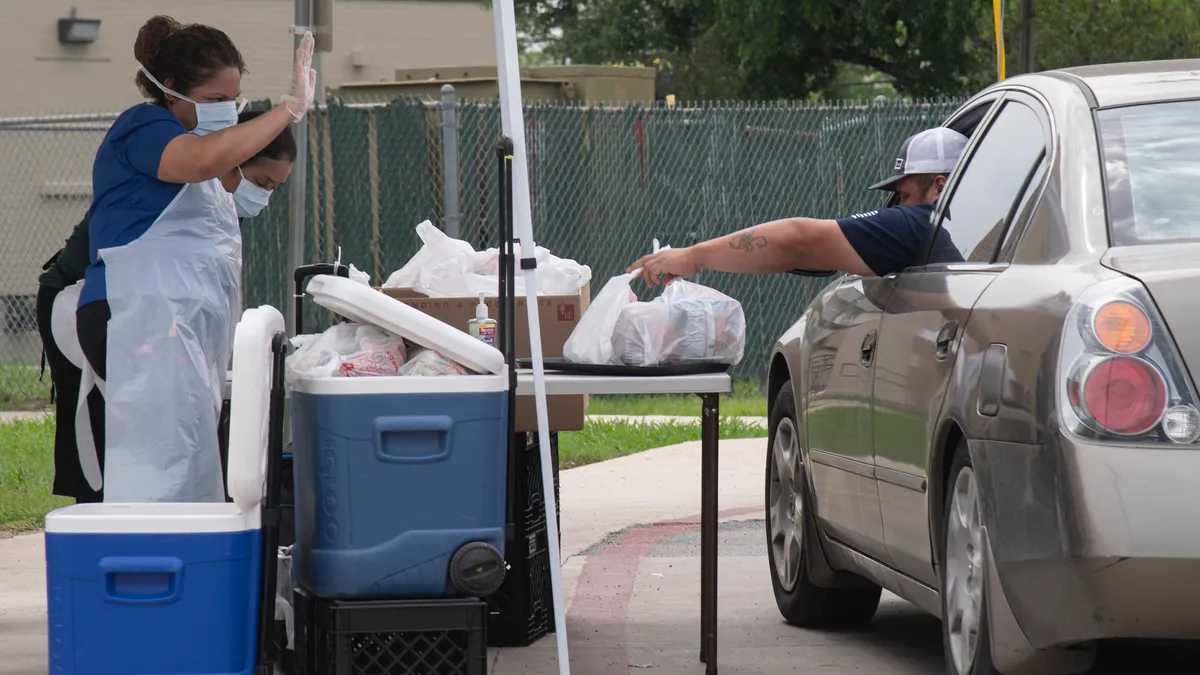Dive Brief:
- The U.S. Department of Labor updated the definition of "health care provider" within its regulations implementing the Families First Coronavirus Response Act in response to an August federal court ruling that struck down aspects of the rule, DOL announced via a temporary rule published in the Federal Register Sept. 11.
- Among the changes is a revision of DOL's definition of which healthcare providers an employer may exempt from taking FFCRA leave. The revised definition "expressly states that an employee is a health care provider if he or she is 'capable of providing health care services.'" DOL said such providers must be "employed to provide diagnostic services, preventive services, treatment services, or other services that are integrated with and necessary to the provision of patient care."
- The rule also addressed other provisions struck down by the court, namely clarifying that employees need not provide the documentation required for taking FFCRA leave before taking the leave. Instead, this documentation "may be given as soon as practicable," DOL said.
Dive Insight:
The changes have "an immediate impact" on healthcare employers, "particularly those that have exempted some or all of their employees from FFCRA leave as a result of the DOL's initial sweeping rule," management-side attorneys with Littler Mendelson wrote in an analysis of the update. DOL's revisions take effect Sept. 16, according to a statement.
DOL's updated healthcare provider definition delineates whom an employer may exclude from taking emergency paid leave under the FFCRA. The term "health care services" in this context "is best understood to encompass a broader range of services than, as in the FMLA context, primarily those medical professionals who are licensed to diagnose serious health conditions," the agency said.
Specifically, this definition includes those capable of providing:
-
Diagnostic services, such as taking or processing samples, performing or assisting in the performance of x-rays or other tests or procedures and interpreting their results.
-
Preventative services, such as check-ups, counseling and screenings to prevent illnesses, disease or other health problems.
-
Treatment services, such as performing surgery or other invasive or physical interventions, administering or providing prescribed medication, or providing or assisting in breathing treatments.
-
Services that are integrated with the above services, including bathing, dressing, hand feeding, taking vital signs, setting up medical equipment for procedures and transporting patients and samples.
The definition also includes workers who provide such services under the supervision, order or direction of — or provide direct assistance to — a healthcare provider. It also includes workers, such as laboratory technicians, who may not directly interact with patients or who might not report to another health care provider or directly assist another health care provider, but who provide services that are integrated with and necessary components to the provision of patient care.
However, the definition does not include workers who do not provide healthcare services — such as information technology professionals, building maintenance staff, HR personnel, cooks and food service workers, among others — even if the services provided by these workers "may be related to patient care."
The above examples are non-exhaustive, DOL said.
DOL notably reaffirmed its requirement that workers who seek to take paid leave under the FFCRA leave may only do so if they would otherwise have work available to them, despite this component being struck down in the August federal court ruling. The updated work-availability rule "enjoys a much stronger chance of surviving legal challenge in the future," the Littler Mendelson attorneys said.













